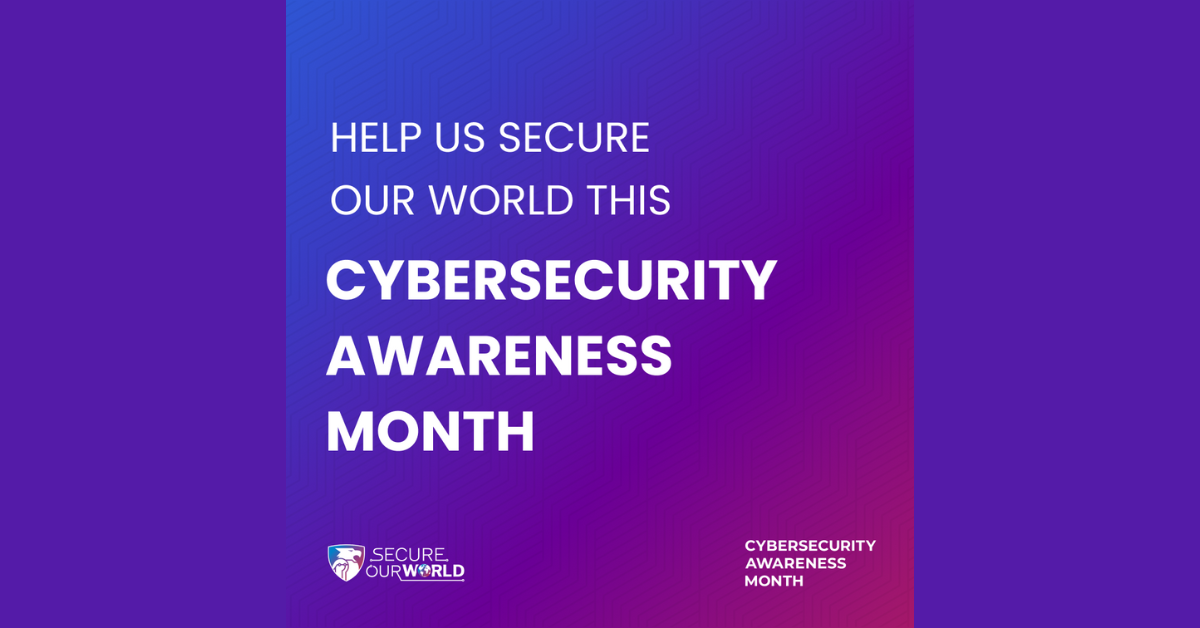National Cybersecurity Awareness Month: 4 Ways to Secure Our World

Hosted by the Cybersecurity & Infrastructure Security Agency (CISA) and the National Cybersecurity Alliance (NCA), October is National Cybersecurity Awareness Month (NCSAM) aimed at raising cybersecurity awareness both nationally and internationally. The NCSAM campaign empowers people and organizations to protect themselves as threat landscapes continue to grow. This year’s NCSAM theme is Secure Our World. There are so many simple ways to protect yourself, family, and business from threats online. The campaign will focus on four ways to secure our world:
- Use of strong passwords and password management
- Turning on Multi-Factor Authentication (MFA)
- Recognizing and reporting phishing
- Updating software
Let’s take a deeper dive into these topics.
Use Strong Passwords and Password Management Software
These days, people are managing tens, even hundreds, of online accounts, and it can be tempting to use the same password over and over. However, that’s not safe practice. It’s important to use a unique password for each account, otherwise, you’re at risk of compromising a lot of data. Weak or repetitive passwords make you vulnerable to hackers who are looking for that one password that can access all of your sensitive information.
But how can you remember a unique password for every single account? That’s where password managers come in. A password manager is software created to store your online credentials in an encrypted database. Passwords managers make it so you don’t have to memorize each unique password. Instead, you only need to remember one—the password for your password manager.
Turn On MFA for Your Accounts
MFA is used for accounts that hold valuable information. You may see MFA used within banks, online stores, or social media accounts—anywhere that holds personal information. It’s a security measure that asks you to take an additional step when logging into your account. This second step not only proves your identity, but it can prevent hackers from breaching your account.
For example, if you have MFA set up for your Gmail account, you can expect to login with your username and password, and then enter a code sent to your phone. Other examples of MFA include entering a PIN when you swipe your debit card or answering a security question before logging into an account.
Using MFA is quick and easy—codes are typically sent and processed immediately, so you don’t have to wait around to access your information.
MFA can also include:
- Facial recognition;
- Fingerprint scanners;
- Authenticator applications; and,
- Secure tokens.
Recognize and Report Phishing
Phishing is when cyber criminals use a fake email to lure you into providing your personal information or installing malware on your device. When recognizing phishing emails, you can look for signs such as:
- Typos, misspellings, and grammatical errors;
- Generic or ambiguous greetings;
- Requests to send personal information;
- Urgency to click on a link or attachment;
- An e-mail address that doesn’t match the company it’s claiming to be from; and,
- Strange or abrupt business requests.
When at work, it’s important to report phishing emails to your IT department or security officer right away. If you experience phishing on a personal device, the best practice is to not click on any links and delete it immediately.
Update Software Automatically and Frequently
Software updates not only fix general issues but also provide security patches for vulnerabilities. A good practice is to set up automatic updates. This will take away the stress of having to manually schedule updates, and it places you a step ahead of bad actors who are looking for ways to reach your data.
It’s also important to download software updates directly from the source and be aware of fake software updates that ask you to urgently download something or enter your information into a form. Unlicensed software or fake pop-up windows could lead to malware and other security problems.
Staying safe online can be easy, and awareness is the first step. As an official NCSAM Champion, BARR Advisory is here to help your organization secure your data through cybersecurity awareness. Contact us for a free consultation to learn more about how you can secure our world.